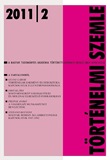Történelmi esemény és struktúra: kapcsolatuk ellentmondásossága
Historical Event and Structure: The Controversial Nature of their Relationship
Author(s): Gábor GyániSubject(s): History
Published by: Magyar Tudományos Akadémia Bölcsészettudományi Kutatóközpont Történettudományi Intézet
Summary/Abstract: The problem of whether the object of the historian’s inquiry and its conceptual foundation is the event or structure, has always been a real watershed and continues to be so. Historiography has traditionally narrated past events. Yet in the 20th century the historians of the Annales school introduced structural history writing. According to Fernand Braudel, event and structure can be distinguished in terms of duration: whereas an event is a happening of short duration, structure can only be interpreted in the sphere of longue durée. This approach has by now been crystallized into a dogma. Historical philosopher Reinhart Koselleck also operates with the conception of historical experience, maintaining that while an event happening in the order of chronological time can be experienced personally, structure can only manifest itself as a generational experience. Later he adds that whereas an event is generally narrated, structures are described, that is, analysed. Yet the question emerges of what an event is. According to Raymond Aron, an event cannot be grasped solely by the experience which corresponds to it. For he argues that no elementary events, only sequences of events exist. And if there are no elementary, atomic events, no event can directly be experienced. And to what extent can event and structure be distinguished from each other, and what does their relationship essentially consist of? On the basis of the concept of the event elaborated by William H. Sewell, Jr., it can be stated that a historical event is a multilinear, longterm sequence of happenings which results in the durable transformation of structures. Such an event is percieved by contemporaries, that is, historical agents, as important. An event is thus not a point-like happening but a longer chain of happenings, which acquires its own historical meaning in the course of, and as the final result of, the process of conceptualisation. This thesis is underpinned by two case studies: the analyses of the siege of the Bastille (14 July 1789) as a historical event presented by Sewell, and of the revolution of Pest on 15 March 1848 provided by the author, along the criteria set out above.
Journal: Történelmi Szemle
- Issue Year: 2011
- Issue No: 02
- Page Range: 145-162
- Page Count: 18
- Language: Hungarian

